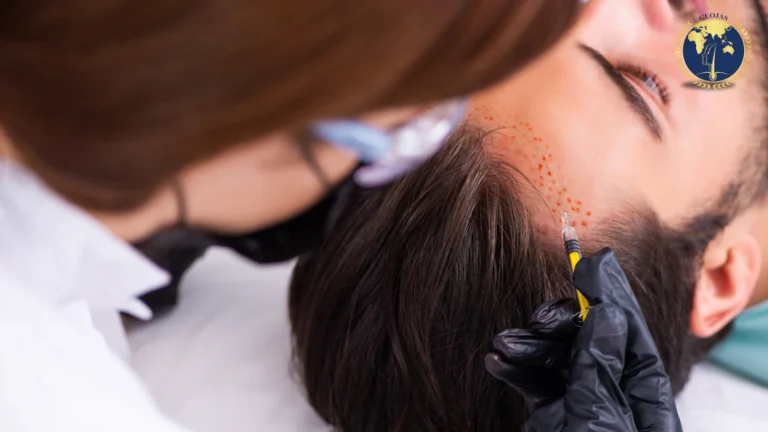Deciding to undergo a hair transplant can be a game-changer in reclaiming your hairline and self-confidence. Whether you’re dealing with male pattern baldness, thinning hair, or significant hair loss, this surgical technique can offer a permanent solution to hair restoration. Before hair transplant journey, understanding the important steps and preparations needed for a successful procedure is crucial. This guide will walk you through necessary precautions, preparations, and considerations to ensure you are fully ready for your hair transplant surgery. From selecting the right medical practitioner to understanding the nature of your intended hair results, we’ll cover all you need to get started on this transformative path.
Understanding Hair Transplant - Before Hair Transplant
What is a Hair Transplant?
A hair transplant is a medical procedure that involves moving hair follicles from one part of the body, known as the donor site, to a bald or balding part of the body, known as the recipient site. Primarily used to treat male pattern baldness, this surgery can also remedy hair loss due to scars, trauma, or diseases affecting hair growth. Techniques may differ, but the most common methods include Follicular Unit Transplantation (FUT) and Follicular Unit Extraction (FUE), both of which offer permanent solutions to hair loss by transferring your own hair.
Who is a Good Candidate?
Ideal candidates for hair transplant surgery are those who have stable hair loss. Men with male pattern baldness, women with female pattern baldness, or individuals who have lost hair due to an injury are often suitable candidates. Importantly, candidates should have enough healthy hair follicles available for transplantation. Patients are typically expected to be in good general health, as potential risks and recovery are closely tied to overall wellness. Understanding that results vary and having realistic expectations are essential psychological factors to consider before proceeding.
Researching Your Options - Before Hair Transplant
Choosing the Right Clinic
Selecting a clinic for your hair transplant is a crucial step in your journey to hair restoration. Look for clinics that specialize in hair transplantation with a proven track record of success. Ensure that the facility is licensed and adheres to standard health and safety protocols. The clinic’s technological advancement is also important, as more modern equipment can lead to more precise and less invasive procedures.
Selecting a Qualified Surgeon

The surgeon’s expertise is arguably the most critical factor in the success of your hair transplant. Confirm that the surgeon has specific training and substantial experience in performing hair transplant surgeries. Certifications by relevant medical boards and memberships in professional bodies such as the International Society of Hair Restoration Surgery can serve as indicators of a surgeon’s proficiency and ethical standards.
Reading Reviews and Testimonials
EXCELLENTTrustindex verifies that the original source of the review is Google. I had my eye injection and laser hair removal done here and I’m very satisfied with the service. The staff are kind, patient and professional. The procedures were done carefully and I felt well taken care of throughout. Clean clinic and great service overall.Posted onTrustindex verifies that the original source of the review is Google. ヘアートランスプラントのために、私は日本からマレーシアに行って、この病院にトランスプラントをやりました。手術とヘアケアの手段をちゃんと説明してくれて、スタッフのみんなさんも優しいです。しかも、手術の値段も高くないし、手術の後もあまり痛くないです。是非、ヘアトランスプラントしたいなら、この病院はお勧めです。Posted onTrustindex verifies that the original source of the review is Google. Excellent clinic with outstanding doctors and staff. It’s been four months since I started treatment, and I’ve already seen significant improvement in my hair growth. The doctor focused on treating my existing hair rather than immediately recommending a transplant, which I truly appreciated. I trusted the clinic and their expertise so much that I flew from Canada twice to be treated here.Posted onTrustindex verifies that the original source of the review is Google. I had my hair transplant done at Glojas and overall it was a very positive experience. Dr JasG handled my case and I appreciated how professional and straightforward he was throughout the process. He took the time to explain the plan clearly, set realistic expectations, and answered my questions without rushing or overselling anything. That gave me confidence going into the procedure. I’d also like to show appreciation to the nurses and assisting staff. They were attentive, gentle, and consistently checked in to make sure I was comfortable during the long procedure. You can tell they’re experienced and used to handling patients with care. Overall, the environment was professional, calm, and well-organized. While it’s still early for final results, the experience itself met my expectations, and I felt I was in capable hands. I would consider recommending Glojas to anyone seriously researching hair transplant options.Posted onTrustindex verifies that the original source of the review is Google. Overall good, nice workPosted onTrustindex verifies that the original source of the review is Google. UPDATE: One year post-transplant. From the great result last year, I travelled again from Australia to Glojas Smart International for another reinforcement transplant procedure from Dr. Jas along his extremely skilful team! My experience this time is as equally amazing as last year (More details below). The medical professionalism, attention to details, pre/post-procedure care are all, yet again, of the highest standards. Being at the clinic has always felt so easy and comfortable, the staffs and environment are nothing but exceptional! Huge shout out to Dr. Jas G!👍 and another Congratulation to Anis for the delighted news! As well as Reine, Sheila and Shaida. It was very lovely to meet all of you again after a year! **For those who are considering and may be worried, please do not hesitate further, I could assure you, this will be the best decision you ever have made! It could only be GLOJAS!** INITIAL Review: Travelling from Australia, my experience with Glojas Smart International was nothing short of amazing! Everything from consultation, to the procedure, to after-procedure care is professionally delivered!👍 The whole time I was there, Dr. Jas G along with his experienced technician, Anis and the entire team, Sara and Bella just to name a few, have made sure I was very well taken care of!!👏Thanks to superior experience from Dr. Jas and his technical expertise, the whole procedure is carried out in compliance to the highest medical standard. The process is incredibly smooth and almost painless. To share a few details, having personally done a detailed research prior to travelling, there is no doubt that Dr. Jas G is one of, if not the most qualified hair transplant surgeon in Malaysia. He is not only the pioneer in Malaysia, he is notably one of a handful of surgeons worldwide, qualified both by the ABHRS (Diplomate) and ISHRS (Fellow) to the highest degree. His entire team is also incredibly professional with many years of experience working alongside Dr. Jas. I have nothing but compliments for Glojas Smart International. I would definitely visit them again for any future procedure and I will highly recommend Glojas Smart International as the place to go in Malaysia!👌Posted onTrustindex verifies that the original source of the review is Google. I would highly recommend this hair transplant clinic as my hair growth result is fantastic after few months. Dr Jas is very professional and accommodating to my request of having m shape hairline, including to perfect the temple to give me the narrow and sharp look, and he delivered. The team is also very detailed and committed, replying my messages whenever I need advices for post transplant care.Posted onTrustindex verifies that the original source of the review is Google. Initially googled and came upon this clinic which at first i thought it was more towards a hair transplant place but it is also a skin aesthetic clinic! Came for consultation and treatment under Dr. Venu for post op scarring and progress so far has been positive, looking forward to more improvements!Posted onTrustindex verifies that the original source of the review is Google. Excellent service by all the staff… 5 star and above. Thank you glojas provide excellent product and service
Gather insights from former patients to understand their experiences with the clinic and the surgeon. Reading reviews and testimonials can provide you with practical information about the effectiveness of the procedures offered, the professionalism of the staff, and the overall satisfaction levels of past clients. While positive reviews can affirm your choices, critical reviews can help you steer clear of potential shortcomings and make an informed decision.
Consultations - Before Hair Transplant
Initial Consultation: What to Expect
During your initial hair transplant consultation, expect a thorough assessment of your scalp and hair loss condition. The medical practitioner will evaluate factors such as hair density, hair quality, and scalp laxity. They will also discuss your medical history to determine if you are a suitable candidate for hair transplant surgery. This session aims to set realistic expectations for the surgery’s outcome based on your specific situation. You can also anticipate receiving detailed explanations about the different transplant techniques, such as FUE (Follicular Unit Extraction) and FUT (Follicular Unit Transplantation).
Questions to Ask Your Surgeon
Preparing questions before your consultation can immensely benefit your understanding and comfort level before undergoing hair transplant surgery. Key questions to consider include:
– What type of hair transplant technique is most suitable for me?
– How many sessions are needed to achieve the desired result?
– What should I expect during the recovery process?
– Are there any potential risks or complications associated with the surgery?
– Can you show me before and after photos of previous patients with similar hair loss as mine?
Celebrity and Hair Transplant
Elon Musk's Experience with Hair Growth


Elon Musk, the entrepreneur behind Tesla and SpaceX, has been widely speculated to have undergone some form of hair restoration treatment. From visibly thinning hair in early photos to a fuller hairline in more recent times, Musk’s hair transformation has been impressive and motivating for many looking into hair transplant options. His journey underscores the importance of selecting skilled, experienced surgeons and illustrates how technological advancements can lead to natural-looking hair transplant results.
Conclusion
Preparing for a hair transplant is a crucial step towards ensuring the success of your procedure. It’s important to follow all the guidelines provided by your medical practitioner, maintain a healthy lifestyle, and set realistic expectations. Remember, the better your preparation, the smoother the process and the better the outcomes. Pay close attention to pre-surgery instructions, engage in conversations with your surgeon to address any concerns, and get ready to welcome the new changes with confidence.
Hair transplantation is a viable choice for people hoping to reestablish their hair and recapture their confidence. By grasping the various sorts of procedures, candidacy, preparation, and recovery processes, patients can make an educated decision about whether hair transplantation is appropriate for them. Consulting with a certified professional is fundamental to examine individual requirements and expectations and foster a customized treatment plan.
GLOJAS Specialist Clinic offers expert hair loss treatment through personalized, evidence-based plans developed by board-certified specialists. Using FDA- and CE-approved technologies like PRP therapy and precision hair restoration, we ensure safe, effective results. Comprehensive aftercare and follow-up support reinforce patient trust, making GLOJAS a reliable authority in hair restoration solutions.
Read More : What Is Hair Transplant?
